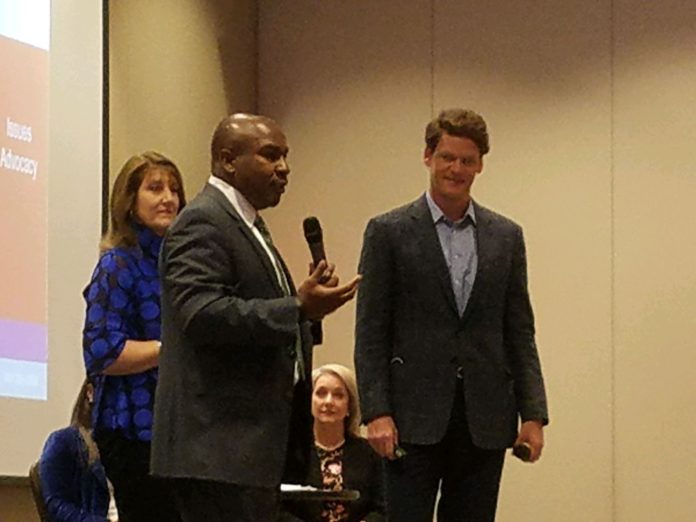The Fort Worth Chamber of Commerce presented a preview of its new strategic plan for economic development across Fort Worth on Sept. 6, which aims to provide support to businesses and position the city as an international business hub.
At the annual economic update, hosted at the TCU Brown-Lupton University Union, Executive Vice President of Economic Development Brandom Gengelbach said the new four-year economic development plan is set to roll out on an experimental basis in October to get community feedback and fully implement a revised plan in November.
Between 2000 and 2016 Fort Worth experienced 60 percent growth making it the 4th largest metro and the 16th largest city in the country, Gengelbach said. The growth has led to changes across city departments and within private businesses based in Fort Worth.
“Our city manager has somewhat of a different view-point when it comes to economic development so I think a lot of things that we have done previously we won’t be doing in exactly the same way. That’s going to require a little communication with our real estate community about how that’s going to work, but I think over the long term it’s going to be a benefit for the city overall,” said Robert Sturns, director of the economic development department for Fort Worth..
The plan will aim to address seven areas of economic interest, called pillars and horizontals, that will support the high level of growth in the city of Fort Worth, according to a graphic provided by the Fort Worth Chamber. The benefits of addressing each category was discussed by 11 experts including city employees, small business owners and large business representatives.
Pillars:
The Business Attraction pillar is meant to attract companies by marketing Fort Worth.
Allyson Baumeister, principal in-charge with CliftonLarsonAllen LLP spoke on Fort Worth’s past issues with cohesive marketing which draws an unfocused business market.
“We have a lot of organizations marketing Fort Worth in a different way and coming together and designing a message that we can all take to the world at large — and be consistent and constant and clear with that message — will be a huge step in the right direction,” Baumeister said.
Talent Development, Retention and Attraction will increase engagement with businesses, educational entities, governments and the community to attract and retain a quality workforce.
“We’re an amazing community, but we also have challenges and that is that 25 percent of our population has a four-year degree. That is a challenging number when competing with Frisco, Plano, Allen, McKinney, these other communities. What can we do to be able to increase that or dilute that number?” Gengelbach said. “Well certainly we need to be helping locally to encourage four-year degrees, but also want to be encourage associate’s degrees and encouraging being able to go to community college and get certain certificates that we need for our work force. So part of our strategy has to be bringing people into the area.”
The Small Business and Entrepreneur Support pillar is meant to provide supporting and programming to entrepreneurs and small businesses to grow the local economy.
“As we grow and small businesses continue to thrive, please remember that we are small businesses and we need the support of the community. When your friends are coming in town from the east coast or the west coast we need that support,” said Jonathan Morris, owner of the Fort Worth Barber Shop. “We need the platform of our local community saying, ‘Hey listen, not only do we have these great world renowned companies […] guess what? This restaurant down the street was started by somebody right here in Fort Worth. This little barbershop down the street was started by somebody right here in Fort Worth.’.”
The Existing Business Retention and Expansion pillar spurs collaboration between the Fort Worth Chamber and Fort Worth area businesses to identify opportunities for growth and enrich the environment for existing businesses.
J.J. Cawelti, senior manager of global affairs with Bell Helicopter, spoke to the level of support the Fort Worth Chamber gives to businesses in order to keep the in the city.
“We came here more than 65 years ago because Fort Worth was a great place to do business. It had good policies, a good fiscal climate, a good work force and frankly they wanted Bell Helicopter to be here. Five or six years ago when Bell decided to rebuild our headquarters we chose to stay in Fort Worth for those same reasons,” Cawelti said.
She continued, “We can’t take for granted that just because a business is here today that this is going to fit the strategy of tomorrow. Fort Worth continues to have a good fiscal environment, it continues to have good fiscal policies and when those things are in jeopardy the chamber has always stepped up to help us.”
Issues Advocacy is a term for how the chamber plans to actively support pro-business legislation and oppose anti-business legislation by engaging and representing businesses in the legislative process and communicating activity to members and stakeholders.
“Grab an issue and look at it and voice your opinion on it because if not [Fort Worth] isn’t going to be the same place that it is today or what it was,” Mosaic Strategy Partners Founder Brinton Payne said.
Horizontals:
The International horizontal will position Fort Worth as an international city through the aforementioned pillars.
Quality of Place will enhance the community’s assets, including transit, educational facilities and affordable housing, to improve its attractiveness and livability.






